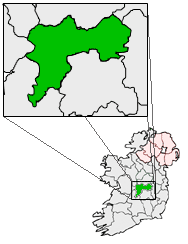|
Froinsias Ó Maolmhuaidh Froinsias Ó Maolmhuaidh (anglicised as Francis Molloy; c. 1606–1677) was a Franciscan friar, theologian and grammarian, author of the first published grammar of the Irish language written in Latin. BiographyEarly lifeÓ Maolmhuaidh was born in the Diocese of Meath, most probably in the district of Fercall, lordship of The Ó Maolmhuaidh, in what was then called King's County. While his exact place within the Ó Maolmhuaidh family is unknown, he recorded stories heard in his youth "of a great Christmas banquet for 960 people, lasting twelve days, held by Calvagh O'Molloy, chief of his name, at the end of the sixteenth century."[1] He appears to have been an uncle to Reverend Seán Ó Dálaigh, a student at Saint Isidore's College, Rome, who seemed to have been the man who acted as censor librorum for Ó Maolmhuaidh's Grammatica.  From Rome to Vienna and back againÓ Maolmhuaidh became a member of the Friars Minor of Strict Observance at the Irish College at Rome on 2 August 1632. In 1642 he was appointed lecturer in philosophy at Klosterneuberg, Vienna, when aged about thirty-six. It was then that his solely theological work, Disputatio theologica de incarnatione verbi ad mentem Joannis Duns Scoti was written, probably as a thesis. It was published in 1645. He received instructions while in Mantua, on 4 May 1647, to proceed to the Irish Franciscan College of St. Isidore, at Rome, to teach philosophy; he was teaching theology there in 1652, and was doing so as late as 1677. While he never seems to have become guardian of the college on the death of Luke Wadding in 1657, he was president for a time in 1671. PublicationsÓ Maolmhuaidh was still in Rome when his Iubilatio genethliaca in honorem Prosperi Baltharasaris Philippi Hispaniarum principis was published there in 1658. "By 1663 he was preparing a course on philosophy for publication. The first part of his Philosophia ... tomus primus dialectiae breviarum complectens was published at Rome in 1666, but no further part was published." [1] His best-known work, Lucerna fidelium, seu, Fasciclus decerptus ab authoribus magis versatis qui tractarunt de doctrin a Christiana (Lochrann na gCreidmheach), was an Irish-language catechism of Catholic church doctrine. It was published in Rome in 1676. This project dated back to 1670, when it was instigated by the secretary of Congregatio de Propaganda Fide, Monsignor Baldeschi, who, along with Cardinal Altieri (later Pope Clement X), were among his most influential friends and contacts in the city. His last printed work, Grammatica Latino-Hibernica nunc compendiata, was the first printed grammar of the Irish language, and was published in 1677. It is in Latin, and consists of twenty-five chapters: nine on the letters of the alphabet, three on etymology, one on contractions and cryptic writings, and twelve on prosody and versification. At the end is an Irish poem by Molloy on the neglect of the ancient language of Ireland and the prospects of its resuscitation.[2] As an Irish FranciscanHe attended a general chapter of the order at Rome in 1664 on behalf of the Irish provincial superior.
Final yearsWhile a commemorative stone at St. Isidore's College erected early in the 1900s gave 1684 as the year of his death, Ó Maolmhuaidh's decease has since been narrowed to sometime in the last quarter of 1677. He died while travelling through France for Ireland, in the company of Seán Ó Dálaigh.[1] See also
References
External links
|